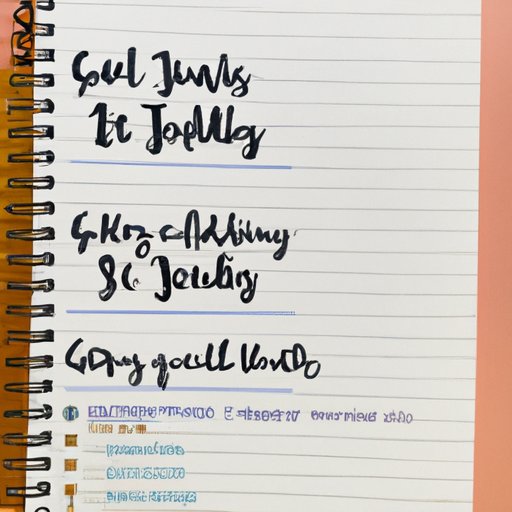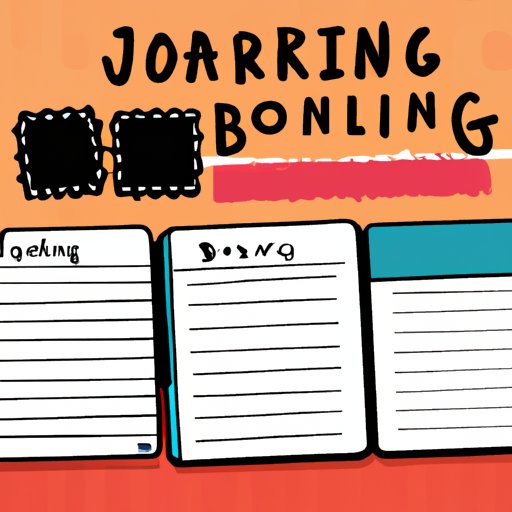Introduction
Journaling is one of the most powerful tools for self-expression and personal growth. It can help to make sense of our feelings, process our thoughts, and reflect on our experiences. Whether you’re writing in a physical notebook or typing away on your computer, journaling is a safe space to be honest with yourself and explore what matters most to you.
What is Journaling?
At its core, journaling is simply the act of writing down your thoughts, feelings, reflections, and observations. It can take many forms, from creative writing to list making, and it’s often used as a tool to help us understand ourselves better. As psychotherapist and life coach Kati Morton explains, “Journaling allows us to take a step back and look at our lives from a distance. It gives us the opportunity to think about our behaviors, our emotions, and our relationships in a more objective way.”
Benefits of Journaling
There are many benefits to keeping a journal. According to a study conducted by the University of Rochester Medical Center, journaling can reduce stress, improve mood, and boost immunity. Other research has found that it can also help to increase self-confidence, foster creativity, and promote problem-solving skills. In addition, journaling can help to clarify our values and priorities, as well as assist in developing healthier habits and behaviors.

Decide What Type of Journaling You Want to Do
Before you dive into journaling, it’s important to figure out what type of journaling works best for you. There are several different types of journaling, each with its own unique purpose and set of benefits.
Different Types of Journaling
One of the most popular forms of journaling is daily journaling, which involves writing down your thoughts, feelings, and experiences on a daily basis. This type of journaling can be helpful for processing your emotions, tracking your progress, and reflecting on your life. Another type of journaling is creative journaling, which involves using words and images to express yourself creatively. This can include drawing, painting, collage, and writing poems or stories. Creative journaling is a great way to tap into your imagination and explore your inner world.
There’s also gratitude journaling, which involves writing down things you’re thankful for. Studies have found that gratitude journaling can help to increase happiness and wellbeing, as well as foster positive relationships. Finally, there’s bullet journaling, which is a form of planning and organizing. Bullet journaling can be used to track goals, plan projects, and keep track of tasks.
Consider What Works for You
When deciding which type of journaling to try, it’s important to consider your needs and interests. Think about what type of journaling resonates with you, and experiment with different styles until you find one that feels right. Don’t be afraid to mix and match different types of journaling, as this can help to keep your practice interesting and engaging.

Find a Space and Time for Journaling
Once you’ve decided on the type of journaling you want to do, it’s time to create a dedicated space and time for your practice. Having a designated area for journaling can help to create a sense of focus and clarity, so it’s important to find a spot that’s comfortable and inspiring. This could be a desk, a chair, or even a cozy corner of your bedroom.
Create a Dedicated Writing Area
When choosing a space for journaling, make sure it’s free from distractions. This could mean turning off your phone, closing the door, or wearing headphones. Also, having the right supplies nearby can help to make journaling more enjoyable. Consider stocking up on notebooks, pens, pencils, and other materials that you might need.

Set Aside Regular Time for Journaling
In addition to finding a space for journaling, it’s also important to set aside regular time for your practice. Choose a time of day that works best for you, such as first thing in the morning or right before bed. If you’re struggling to find the motivation to write, try setting a timer and committing to writing for just five minutes. Once you get started, you may find that the ideas start flowing and you don’t want to stop.

Set Goals for Your Journals
Setting goals for your journaling practice can help to keep you motivated and focused. Start by identifying your overall goals, such as developing self-awareness or exploring creative expression. Then break these goals down into smaller, more achievable steps. For example, if your goal is to become more self-aware, you could commit to writing in your journal every day for 10 minutes and reflecting on your writing once a week.
Choose the Right Materials and Tools
The type of journaling you choose will determine the materials and tools you need. When selecting a journal, be sure to pick one that’s comfortable and easy to use. Many people prefer physical notebooks, but there are also plenty of digital options available. As for writing utensils, pens and pencils are always a good choice, but you can also experiment with markers, crayons, and other art supplies.
Start Writing and Reflecting
Once you’ve chosen the right materials and tools, it’s time to start writing. Establish a writing routine that works for you, and stick to it. If you’re feeling stuck, try using prompts to get started. Prompts can range from simple questions to open-ended statements, such as “What am I grateful for today?” or “I feel most alive when…”
Finally, be sure to take some time to reflect on your writing. This can help to deepen your understanding of yourself and your experiences. Ask yourself questions such as “What surprised me about my writing?” or “What did I learn about myself?” The answers to these questions can provide valuable insight into your thoughts and feelings.
Conclusion
Journaling is a powerful tool for self-expression and personal growth. It can help to make sense of our feelings, process our thoughts, and reflect on our experiences. Before getting started, it’s important to decide which type of journaling works best for you and find a dedicated space and time for your practice. Additionally, setting goals and choosing the right materials and tools can help to make your journaling experience more meaningful and enjoyable. With commitment and dedication, you can reap the many benefits of journaling.
(Note: Is this article not meeting your expectations? Do you have knowledge or insights to share? Unlock new opportunities and expand your reach by joining our authors team. Click Registration to join us and share your expertise with our readers.)
